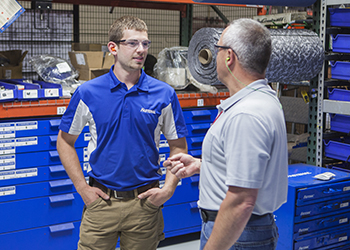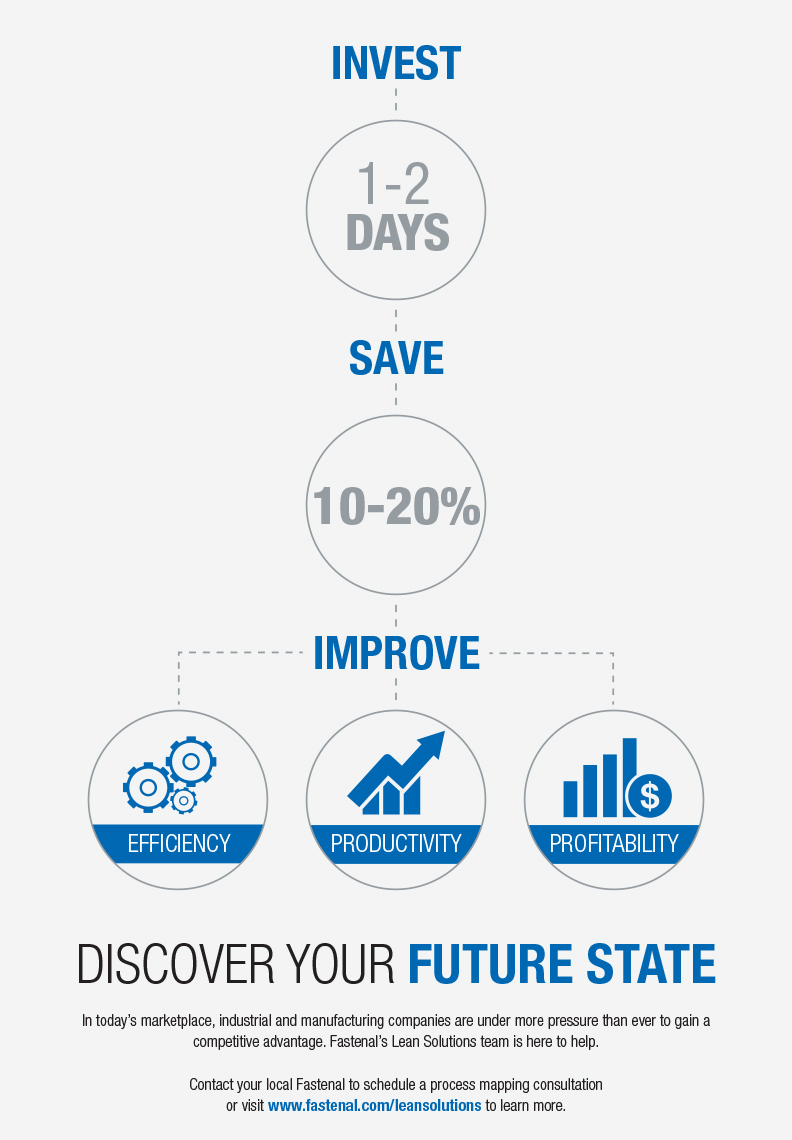Today’s globally competitive environment is challenging manufacturers in virtually every industry to do more with less – less inventory, less time, less waste, less expense. The unfortunate byproduct of that pressure is an increasingly complex supply chain in which manufacturers engage with more and more suppliers who promise cost savings from out-of-the-box solutions or a trending technology, only to find the results less than impactful.
At Fastenal, we understand your business is unique. The key to operational efficiency within your organization isn’t an off-the-shelf inventory management program. To achieve measurable results tied to your specific goals, you deserve a 360-degree approach to uncover waste, drive out expenditures, and reduce assets, ultimately improving productivity and increasing revenue.
Fastenal’s Lean Solutions team is dedicated to helping you create process efficiency within your supply chain. Our approach, based on the principles of lean manufacturing, begins by uncovering hidden sources of waste through process mapping.
Fastenal's team of Lean Six Sigma Black Belts and Sensei can work with your personnel to map how product moves through your current system and identify bottlenecks, extra steps, and other sources of waste. You'll be presented with new opportunities to create flow, eliminate waste, and drive out costs.

As part of the process, our Lean Solutions team will work with key personnel in your organization (the plant manager, receiving personnel, inspectors, buyers, et. al.) to map how product flows through your system, identify areas of waste, and propose ideas to drive down costs within your supply chain.
You know your business better than anyone else. That is why our process is 100% collaborative. We set your productivity as our priority, keeping our assessment focused on the results you hope to achieve. At the end of a process mapping event, the Fastenal Lean Solutions and customer team provide a summary calculating how improved productivity and profitability can be achieved in the following areas:
While your productivity is tied to the availability of critical inventory, your bottom line is directly impacted when too much working capital is tied up in excess or non-contributing inventory. By determining proper stocking levels and reducing on-hand inventory, you can redirect cash to growth-driving activities.
As much as 70-95% of process time is wasted on non-value added steps. By utilizing waste identification tools, such as site observation and data analysis, in collaboration with lean experts, your business can identify and remove waste to streamline your supply chain, improve productivity, and gain a competitive advantage.
Waste occurs not just in larger processes, but also in the operation of individual work cells. By assessing workstation design and applying principles of Lean, you can eliminate waste and improve productivity in each workstation, providing exponential benefits when applied throughout a facility.
Effective supply chain management hinges on visibility, not only of what inventory you have, but of who uses what, when, and how much. Inventory tracking software, point-of-use vending, and detailed consumption reporting are examples of accountability controls that combat common inventory concerns like overconsumption, shrinkage, and hoarding.
Kanban is a pull system that utilizes visible markers, such as cards or strategically sized containers, to clearly display when additional inventory is required for production. Effective Kanban systems are built around your production process and should be evaluated regularly to identify new system efficiencies.
Kaizen promotes a constant, collaborative effort between management and workers to eliminate waste from production. Your suppliers also play a key role in Kaizen, providing visibility to cost drivers and proposing alternatives that result in potential savings through ongoing process and product improvements.
6S is an industry accepted control and sustainment method designed to increase efficiency, lower worker stress, reduce accidents, and improve quality. Applying the pillars of 6S (Sort, Systematic Organization, Shine, Standardize, Sustain, and Safety) is often the first and most impactful step towards a lean transformation.
Whether your goal includes operational efficiency, labor utilization, or inventory reduction, a thorough gap analysis can help you develop a clear picture of your current state as compared to your desired future state, a critical step in planning for and executing on strategic process improvements.
For Fastenal, process mapping is not just an exercise. It is a way to gain a deeper understanding of your business goals so we can move forward as a dedicated supply partner. We work with you from the onset to define a clear cost reduction goal. We then collaborate with your teams to plan and implement relevant inventory solutions that target that goal. But it doesn’t end there.
As your supply partner, we commit to not only regularly report on progress, but also to monitor the adoption of our solutions for additional needs or improvements over time. With custom-designed in-house reporting tools, we track and document your total cost savings, using agreed upon metrics to calculate the value of the services and solutions we offer. Typically, our cost savings programs save customers 15-30% based on quantification and qualification of total cost savings during year one of a strategic program.
Because Fastenal is committed to continuous improvement through collaboration, our programs also offer an opportunity for year-over-year cost savings throughout the duration of the partnership. These unfolding savings are driven through aggressive process improvement, inventory reduction, product standardization, and vendor consolidation.
In today’s marketplace, industrial and manufacturing companies are under more pressure than ever to gain a competitive advantage. Fastenal’s Lean Solutions team is here to help. Contact your local Fastenal to schedule a process mapping consultation or visit www.fastenal.com/leansolutions to learn more.
